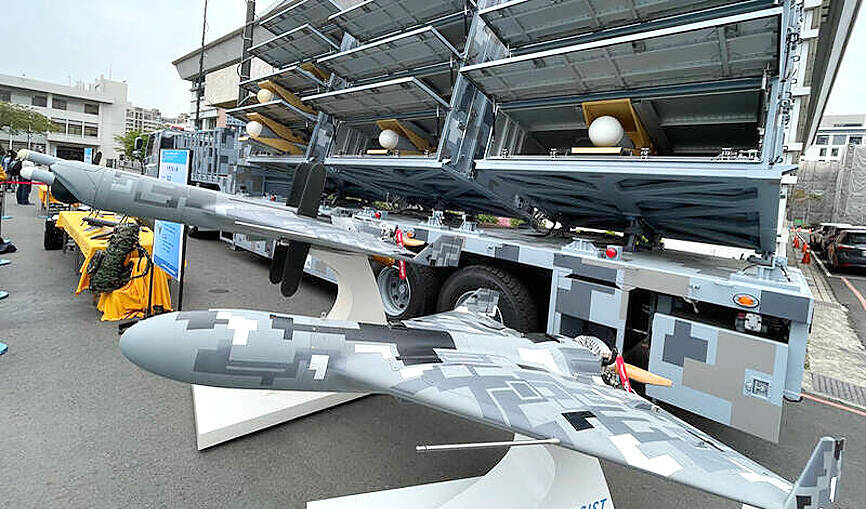The Ministry of National Defense (MND) has included the funding needed to mass-produce Type-1 and Type-2 suicide drones in next year’s budget plan, a military source said yesterday.
Although the US government last month approved sales of Switchblade 300 loitering munitions and Altius 600M-V uncrewed aerial vehicles to Taiwan, which are scheduled for delivery between this year and the next, military leaders assessed that Taiwan would still have an inadequate number of attack drones to bolster national defense, the source said, asking to remain anonymous.
Taiwan needs to mass produce locally made attack drones, including Type-1 and Type-2 suicide drones, they said.

Photo: Taipei Times file
Meanwhile, mass production of Chien Hsiang anti-radiation drones, developed by the Chungshan Institute of Science and Technology, would be completed next year, they said.
The anti-radiation drone’s functions would be improved, while the ministry would continue to produce drones with enhanced functions at a smaller scale using the annual defense budget, the source said.
Chien Hsiang drones are designed to lock in on and attack radar stations, including those on ships, while Type-1 and Type-2 suicide drones are mainly used by ground troops on anti-armor missions, they said.
Similar to the Switchblade 300, Type-1 suicide drones are designed as easy-to-use equipment for soldiers and can be deployed quickly, the source said.
The flight time of a Type-1 suicide drone is about 15 minutes, with a guided control range exceeding 10km, institute data showed.
Type-2 suicide drones have a longer flight time, and can carry out reconnaissance and attack missions beyond visual range using imagery, infrared and microwave systems to trace targets. They can also be used for swarm attacks and can be installed on ships and vehicles.
In other news, the navy might conduct a sinking exercise during the one-month live-fire drills after the Han Kuang exercises.
The Sink Exercise (SINKEX) program is one of the highlights of the second phase of the Rim of the Pacific exercises, which are to begin today. Military units participating in the SINKEX exercise are to use a range of anti-ship weapons to sink the retired 40,000-tonne USS Tarawa, an amphibious assault ship.
The Maritime and Port Bureau on Friday announced that the navy is to conduct live-fire training from July 30 to Aug. 30.
The drills would be conducted in three main areas.
The first area would be in the waters and airspace east of Taitung and Pingtung counties, and west of Green Island (綠島) and Orchid Island (Lanyu, 蘭嶼), the bureau said.
The second area covers the sea and airspace extending from the east coast of Taiwan more than 140km from the east coasts of Green and Orchid islands.
The third area covers sea and airspace south of Hengchun Peninsula (恆春半島) and Orchid island.
The live-fire training would be conducted by the Navy Command Headquarters, rather than by the Chungshan Institute as in the past, the bulletin said.
Based on what the navy is currently using, the live-fire training could include anti-ship and anti-aircraft missiles, such as Hsiung Feng III missiles, which are capable of destroying land-based and naval targets.

The US government has signed defense cooperation agreements with Japan and the Philippines to boost the deterrence capabilities of countries in the first island chain, a report by the National Security Bureau (NSB) showed. The main countries on the first island chain include the two nations and Taiwan. The bureau is to present the report at a meeting of the legislature’s Foreign Affairs and National Defense Committee tomorrow. The US military has deployed Typhon missile systems to Japan’s Yamaguchi Prefecture and Zambales province in the Philippines during their joint military exercises. It has also installed NMESIS anti-ship systems in Japan’s Okinawa

‘WIN-WIN’: The Philippines, and central and eastern European countries are important potential drone cooperation partners, Minister of Foreign Affairs Lin Chia-lung said Minister of Foreign Affairs Lin Chia-lung (林佳龍) in an interview published yesterday confirmed that there are joint ventures between Taiwan and Poland in the drone industry. Lin made the remark in an exclusive interview with the Chinese-language Liberty Times (the Taipei Times’ sister paper). The government-backed Taiwan Excellence Drone International Business Opportunities Alliance and the Polish Chamber of Unmanned Systems on Wednesday last week signed a memorandum of understanding in Poland to develop a “non-China” supply chain for drones and work together on key technologies. Asked if Taiwan prioritized Poland among central and eastern European countries in drone collaboration, Lin

ON ALERT: Taiwan’s partners would issue warnings if China attempted to use Interpol to target Taiwanese, and the global body has mechanisms to prevent it, an official said China has stationed two to four people specializing in Taiwan affairs at its embassies in several democratic countries to monitor and harass Taiwanese, actions that the host nations would not tolerate, National Security Bureau (NSB) Director-General Tsai Ming-yen (蔡明彥) said yesterday. Tsai made the comments at a meeting of the legislature’s Foreign Affairs and National Defense Committee, which asked him and Minister of National Defense Wellington Koo (顧立雄) to report on potential conflicts in the Taiwan Strait and military preparedness. Democratic Progressive Party (DPP) Legislator Michelle Lin (林楚茵) expressed concern that Beijing has posted personnel from China’s Taiwan Affairs Office to its

BACK TO WORK? Prosecutors said they are considering filing an appeal, while the Hsinchu City Government said it has applied for Ann Kao’s reinstatement as mayor The High Court yesterday found suspended Hsinchu mayor Ann Kao (高虹安) not guilty of embezzling assistant fees, reducing her sentence to six months in prison commutable to a fine from seven years and four months. The verdict acquitted Kao of the corruption charge, but found her guilty of causing a public official to commit document forgery. The High Prosecutors’ Office said it is reviewing the ruling and considering whether to file an appeal. The Taipei District Court in July last year sentenced Kao to seven years and four months in prison, along with a four-year deprivation of civil rights, for contravening the Anti-Corruption